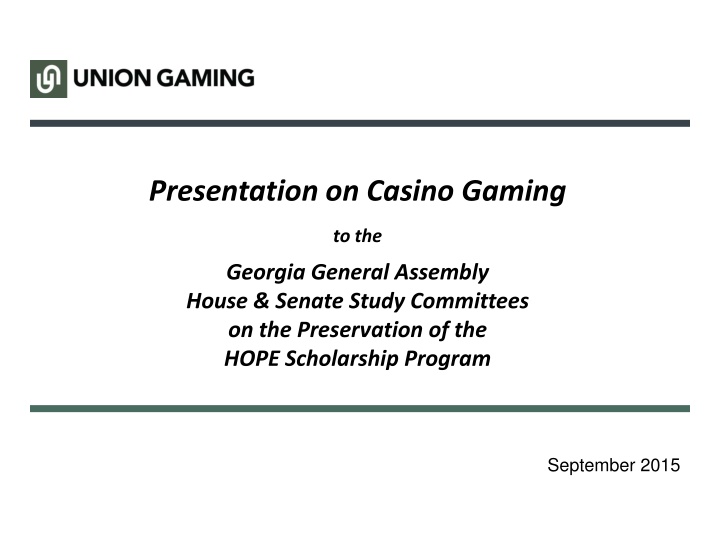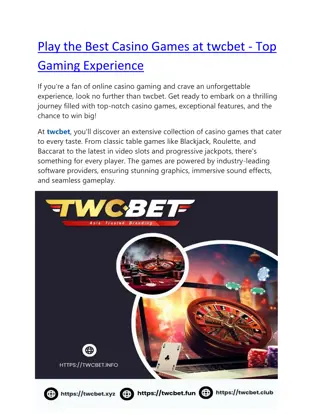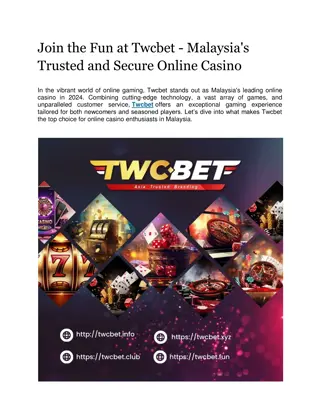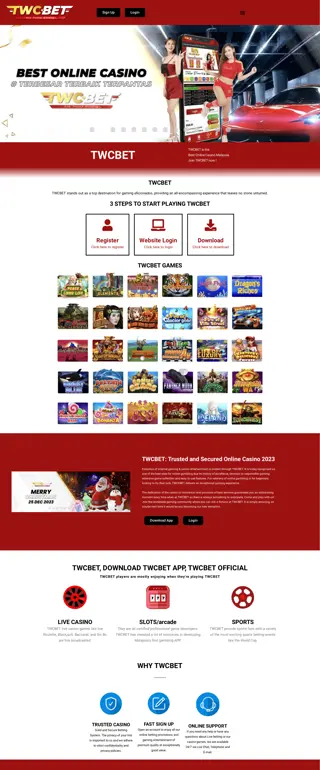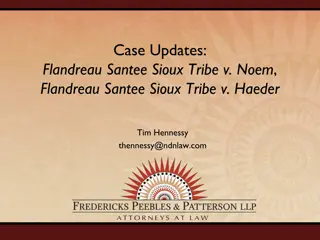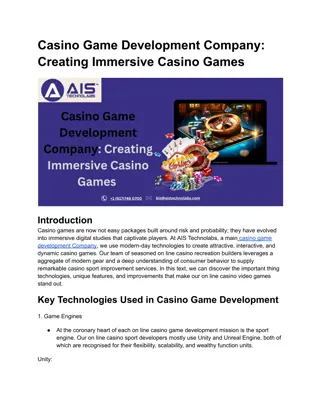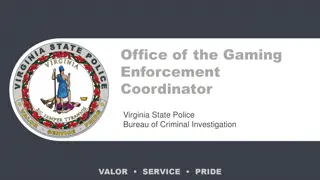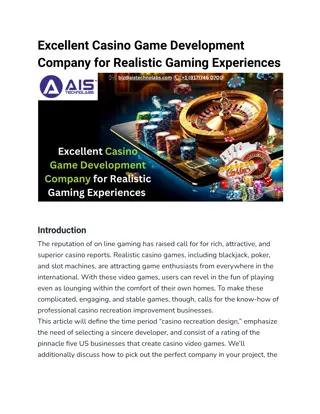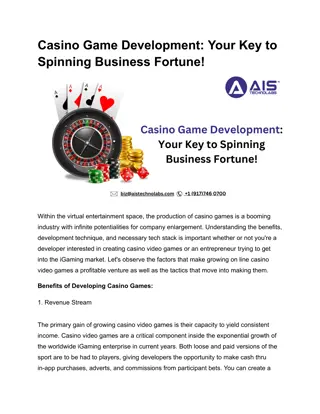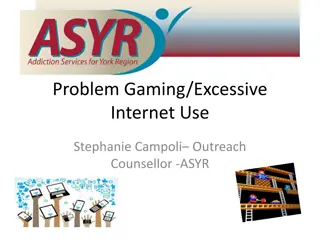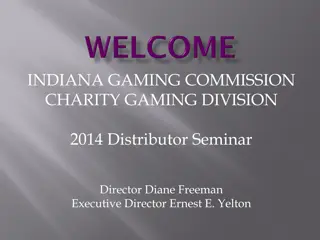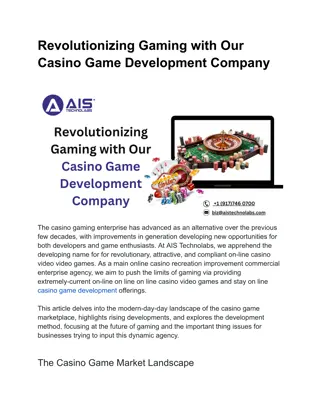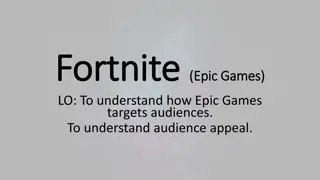Presentation on Casino Gaming
Image-based presentation on casino gaming to the Georgia General Assembly House & Senate Study Committees in September 2015. It includes information on Union Gaming, Wall Street's perspective on casino gaming finance, considerations in casino finance and regulation, and how casino projects are financed.
Download Presentation

Please find below an Image/Link to download the presentation.
The content on the website is provided AS IS for your information and personal use only. It may not be sold, licensed, or shared on other websites without obtaining consent from the author.If you encounter any issues during the download, it is possible that the publisher has removed the file from their server.
You are allowed to download the files provided on this website for personal or commercial use, subject to the condition that they are used lawfully. All files are the property of their respective owners.
The content on the website is provided AS IS for your information and personal use only. It may not be sold, licensed, or shared on other websites without obtaining consent from the author.
E N D
Presentation Transcript
Presentation on Casino Gaming to the Georgia General Assembly House & Senate Study Committees on the Preservation of the HOPE Scholarship Program September 2015
Who is Union Gaming Union Gaming Group is a boutique investment bank and securities firm focused exclusively on the global casino and integrated resort industry. Uniquely based in Las Vegas, Macau, Hong Kong, and New York City, the company specializes in equity research, securities trading, and investment banking services for a broad range of clients which includes casino operators, local real estate partners, governments, and institutional money managers. Through its Union Gaming Analytics subsidiary, the company also provides gaming market studies, feasibility work, and various market analyses for corporate and government entities. Bill Lerner has spent 20 years on Wall Street in sell-side research and investment banking. He co-founded Union Gaming and currently leads its investment banking practice. Prior to this, he was Managing Director and Senior Gaming & Lodging analyst at Deutsche Bank Securities. This followed ten years at Prudential Securities and Deutsche Morgan Grenfell. Lerner has been recognized by Institutional Investor as part of its All American Research Team and Wall Street Journal s Best of the Street. Bill Lerner Principal & Global Head of Investment Banking Las Vegas 2
The Wall Street Perspective on Casino Gaming Finance 3
When Considering Casino Finance & Regulation One chance to get it right Every change to legislation matters The right structure can potentiate optimization of: Investment Tax revenue Broader economic impact, including job creation Tourism The right structure can/should maximize these benefits while maintaining social protection. Onus on legislators to optimally level-set regulations for: Minimum investment Gaming tax rates Oversight Opportunity for new gaming markets to benefit from best practices of forty (40) regional (State) gaming markets nationally. 4
How Casino Projects are Financed Benefit of project finance without public/State funding or support Global & Regional Gaming Operators can rely on existing critical mass Balance Sheet Debt Markets Equity Markets Project finance sourced through public (or private) capital markets, NOT with public money Projects not dependent on potentially-controversial tax abatement or tax credit programs Achieve economic development without tapping State bonding authority, other public funding mechanisms, or resources potentially allocable to other State programs. 5
The Casino P&L NEVADA GAMING FY14 - Consolidated Results for Gaming Establishments with GGR +$1,000,000 As a % of Total Revenue Total Locations Las Vegas Strip 45 REVENUE Gaming Rooms Food Beverage Other TOTAL REVENUE 36.8% 26.1% 15.4% 7.4% 14.4% 100.0% Cost of Sales GROSS MARGIN 6.7% 93.3% Departmental Expenses DEPARTMENTAL INCOME 51.8% 41.6% GENERAL & ADMINISTRATIVE EXPENSES Interest Expense Depreciation & Amortization - other (non-Buildings) Depreciation - Buildings Payroll - Other Employees (non-Officer) Music & Entertainment Payroll - Employee Benefits Energy Expense (electricity & gas) Advertising & Promotion Taxes - Real Estate Utilities (Other than Energy Expense) Complementary Expense Payroll Taxes Rent of Premises Taxes & Licenses - Other Payroll - Officers Bad Debt Expense Equipment Rental & Lease Other G&A (omitted as non-cash, non-fundamental items) TOTAL GENERAL & ADMINISTRATIVE EXPENSES 15.4% 5.8% 4.7% 4.4% 2.1% 1.7% 1.4% 1.1% 0.9% 0.5% 0.4% 0.4% 0.4% 0.3% 0.2% 0.0% 0.0% 0.0% 39.8% 6 NET INCOME before Federal Income Tax & Other Items 1.8%
Impacts of the Legislative/Regulatory/Competitive Environment on Operators & Investment Decisions 7
Gaming Tax Rate Inverse relationship between tax rate and investment Direct relationship between investment and jobs, quality of amenities, tourism, and vendor spending States are competing with facilities, amenities, and tax rates in neighboring jurisdictions Among U.S. markets, HIGH gaming tax rates tend to hinder overall investment per property: Effective Gaming Tax Rate/Range Jurisdiction New York Racinos (2) 67.5% Delaware 56.2% Pennsylvania Illinois (3) 55.0% Graduated up to 50.0% Massachusetts (slot parlor) 49.0% Maine 48.2% Indiana Graduated up to 40.0% WEST VIRGINIA 35.0% Tax rate data from 2013/2014 (2) Some New York racinos pay an effective tax rate of ~70%. (3) The average tax rate for the Illinois riverboat casinos was 34.2% in 2014. 8
Gaming Tax Rate Inverse relationship between tax rate and investment Direct relationship between investment and jobs, quality of amenities, tourism, and vendor spending States are competing with facilities, amenities, and tax rates in neighboring jurisdictions Among U.S. markets, LOW gaming tax rates can promote higher investment per property: Effective Gaming Tax Rate/Range Jurisdiction Nevada 6.75%-7.75% New Jersey 9.3% MISSISSIPPI 8.0%-12.0% Colorado Graduated up to 20.0% Missouri 21.0% LOUISIANA 21.5% Notably, the prospect for Alabama gaming is TBD. A gaming bill passed Senate committee approval (6-2) in early-August, but remained highly- contested going into the full Senate chamber last month. Michigan 24.0% Massachusetts (land-based) 25.0% Kansas 27.0% Ohio New York Casinos (1) 33.0% 37.0% Tax rate data from 2013/2014 (1) Three licenses recently awarded for new development. 9
Gaming Tax Rate Inverse relationship between tax rate and investment Direct relationship between investment and jobs, quality of amenities, tourism, and vendor spending States are competing with facilities, amenities, and tax rates in neighboring jurisdictions Cumulative 5-year Gaming Property Investment / Re-Investment, by State 2012-14 Actual, 2015-2016 Projected/Committed 10
Gaming Tax Rate Georgia will be competing with facilities, amenities, and tax rates in neighboring jurisdictions This INCLUDES tribal gaming operations in adjacent markets: Alabama, Florida, and North Carolina Effective tax rates paid under compact by Tribal Gaming Operators: Effective Gaming Tax Rate/Range State Tribal Jurisdiction Alabama Poarch Band of Creek Indians N/A, compact under negotiation Florida Seminole Tribe of Florida Following the initial 24-months: 3% local to the county/municipality Graduated 12.0%-25% of Net Win North Carolina Eastern Band of Cherokee Indians 4%-8% of table games GGR (increasing percentage every 5 years) 30-year compact initiated 2012 11
Inherent Power in Certainty & the RFP Process CERTAINTY as a tool to fuel investment (i.e., IL, LA, NJ) Certainties beyond defined tax rates/structures, including parameters/burdens to entry, will fuel commitments Significant investment is made more palatable with visibility into hurdles in place that ward-off the possibility of referendum or future legislative action which could result in unexpected competition. Operators considering markets will always seek/prefer to protect investments via some notion of exclusivity COMPETITIVE RFP process allows a market to maximize its opportunity A formalized, deliberate RFP process allows the State a forum in which to outline clear objectives Clarifying the intended or proposed tax structure Defining goals with respect to target markets and tourism (whether primarily intra-State or inter-State) Setting expectations with respect to development and project scale (i.e., via minimum investment thresholds) 12
Applying Lessons Learned & Best Practices from U.S. Regional Markets 13
Varying Approaches Yield Intended Results Phased Roll-out (aka Piecemeal ) Approach i.e., Delaware, Rhode Island, West Virginia Opted for an approach to pursue VLTs first with intent to add table games pursuantly Rationale was to minimize initial investment, thereby facilitating speed to market Short-horizon, convenience-oriented approach Intended result is to establish a locals-centric market (as opposed to a destination market). Integrated Approach i.e., Louisiana, Massachusetts, Mississippi Pursued large-scale development at the outset of casino gaming implementation Embrace casino gaming as part of the State s tourism and economic development identity Sanction large-scale projects purpose-built for economic growth for the State Longer-horizon, cooperative effort with State tourism to bring revenue and to stimulate growth. And from SE Kansas A Word to the Wise In this case, conditions set in the RFP were too restrictive. Geographically set too close to existing, established competition (NE Oklahoma) Potential bidders therefore could justify neither the minimum investment threshold ($250MM) nor the proposed one-time licensing fee ($50MM). With no interest bidders, KS has been forced to revise its thresholds and fees by 80%-90%. 14
